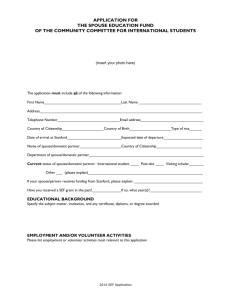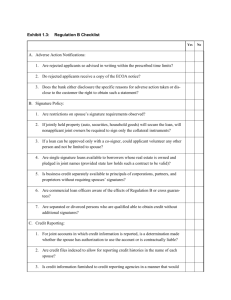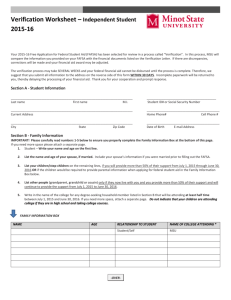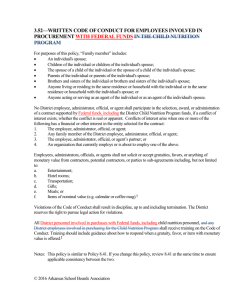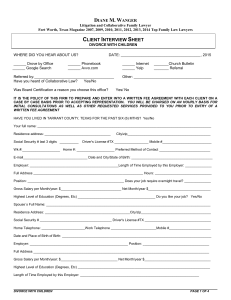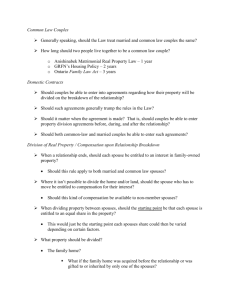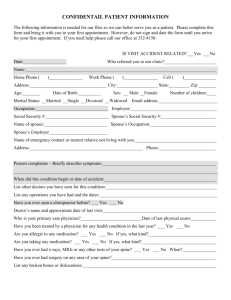Communication Styles in Marriage
advertisement
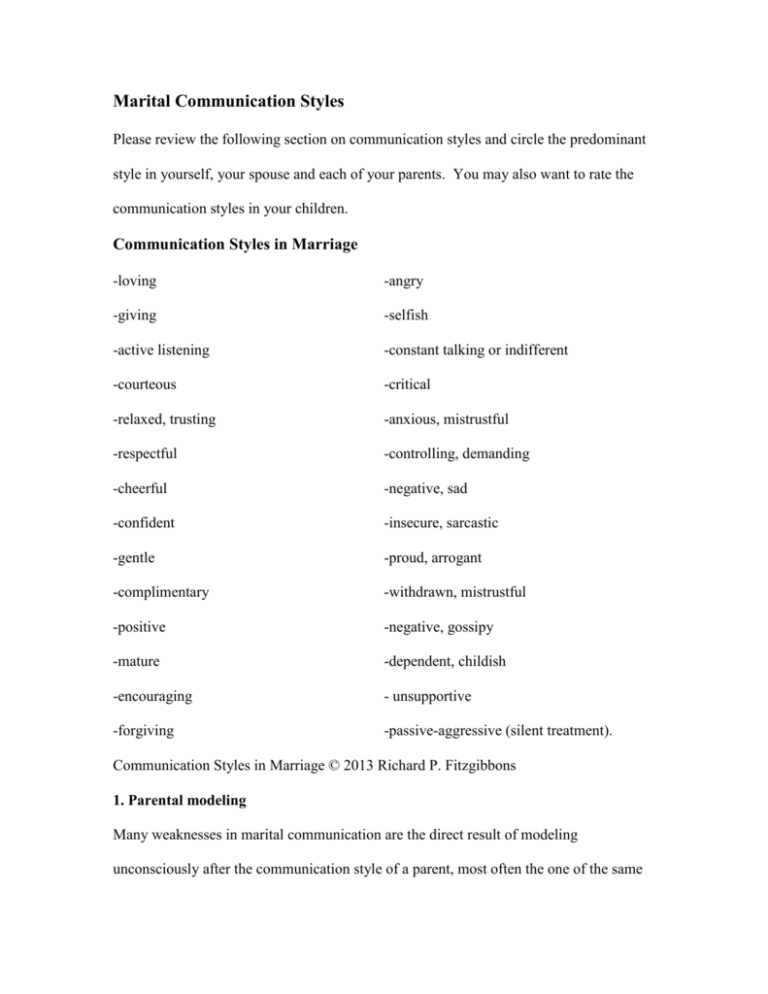
Marital Communication Styles Please review the following section on communication styles and circle the predominant style in yourself, your spouse and each of your parents. You may also want to rate the communication styles in your children. Communication Styles in Marriage -loving -angry -giving -selfish -active listening -constant talking or indifferent -courteous -critical -relaxed, trusting -anxious, mistrustful -respectful -controlling, demanding -cheerful -negative, sad -confident -insecure, sarcastic -gentle -proud, arrogant -complimentary -withdrawn, mistrustful -positive -negative, gossipy -mature -dependent, childish -encouraging - unsupportive -forgiving -passive-aggressive (silent treatment). Communication Styles in Marriage © 2013 Richard P. Fitzgibbons 1. Parental modeling Many weaknesses in marital communication are the direct result of modeling unconsciously after the communication style of a parent, most often the one of the same sex. However, it's not uncommon to repeat the weaknesses of the parent of the opposite sex, especially if intensive forgiveness has not occurred with that parent. The bottom line is that the more we forgive a parent for his/her weaknesses, the less likely we are to act/communicate like them. Did your parents appear to enjoy talking with each other? Were they able to address major concerns without overreacting emotionally? Have you and your spouse modeled after the communication style of each parent in some ways? What about the communication style of your in-laws? Even if you don’t know for sure what their interactions were like throughout their marriage, do you think your spouse grew up in a home with healthy marital communication? The most common parental communication conflicts we see repeated in husbands are being emotionally distant or angry like their fathers and in wives of being controlling or disrespectful like their mothers. However, spouses who had a controlling or angry parent of the opposite sex can repeat the same harmful communication pattern, often because they harbor deep unconscious resentment toward that parent. A major challenge here is that it is difficult to admit our own weaknesses acquired from modeling after a parent. Why? The basic reasons are pride gets in the way and it’s easier to blame our spouse than grow in self-knowledge. It took a spouse a long time to recognize how the ability to communicate in a positive, loving way had been damaged because of the absence of a good role model in one or both parents or because of excessive anger expressed between parents. Forgiveness therapy can help in the breaking a negative parental communication legacy. 2. Anger & Criticism The spouse who has not yet learned to master anger by growth in the use of the virtue of forgiveness overreacts in irritability to minor life stresses, rehashes hurts and has difficulty in letting go, is often too critical, frequently gives the silent treatment and is usually a poor listener. Also, the spouse who is the recipient of this anger loses trust, puts up walls and communicates less. 3. Selfishness This ancient, powerful enemy of marital love manifests itself in an obsession with talking about oneself and one’s feelings, an unwillingness to listen, an indifference to spouse’s needs, a failure to include a spouse in important decision making, a preoccupation with self-interests, an inability to say I am sorry and request forgiveness, a reluctance to affirm or compliment, a preference for screen time rather than communication with one’s spouse and children, an endless portrayal of oneself in the victim role and a lack of interest in sharing the faith. Many spouse are surprised when they uncovered a number of weaknesses in this area. 4. The Control Compulsion The controlling spouse wants to dominate the conversation, fails to speak with respect, refuses to listen, interrupts regularly, tries to stop a spouse from expressing his/her views, ends or changes conversations abruptly, is overly negative, fails to be positive and often criticizes a spouse in front of the children, relatives and even friends. Wives who had angry, addicted or selfish fathers and husbands who had a controlling mother often manifest this harmful communication style. 5. Insecurity and Emotionally Distant The insecure or emotionally distant spouse can be overly quiet, feels too inadequate to share ideas, may be overly critical and negative to try to enhance self-esteem, speaks too quickly, communicates in an anxious manner, talks in an immature manner and rarely offers positive content. Spouses with severe insecurity often have an overwhelmingly negative communication style. 6. Sadness/Loneliness The lonely, sad spouse almost always has irritability associated with depression, lacks energy to communicate in a positive manner, is withdrawn and overly quiet, rarely smiles when speaking, resents giving verbally, and fails to respond in a positive, loving manner. However, some lonely spouses can be non-stop talkers, because of their need for attention. 7. Anxiety/Mistrust/Excessive Independence This spouse seems very tense and irritable when communicating. Communication with this spouse is rarely relaxed and is often filled with negative content. These spouses often appear overly exhausted and seem to lack the energy to be sensitive. They can be overly independent and distant because of trust wounds from their childhood. Chad came to recognize that his parents’ frequent arguments and divorce damaged his ability to feel safe in marriage. Can you identify many of these conflicts being the origin(s) of stress in the communication in your marriage or with your in-laws? If so, please note them. 1. 2.

